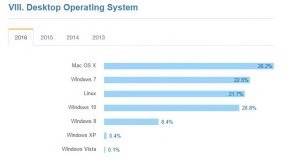Microsoft used to be able to count on developers to embrace its technologies and extend its lead in the enterprise. Today that relationship is much more complicated, as evidenced by a new Stack Overflow developer survey.
Let’s be clear: the new Microsoft under CEO Satya Nadella has been rejuvenating its partnership with developers for years, and that work is bearing fruit. But as the Stack Overflow survey of over 50,000 developers highlights, there’s still work to do. Maybe.
Even as the survey suggests growing dissatisfaction with Microsoft’s native platform development tooling, Microsoft has extended its reach to where developers prefer to play: cloud and web application development. So Microsoft may be losing one skirmish in the native platform battle, even as it wins the overall developer war.
Microsoft developers loving the new vibe…maybe
Though Microsoft is arguably cool again, much of its development tooling is not, according to Stack Overflow’s massive survey. For example, Visual Basic is the second-most popular development environment…but 79.5% of developers apparently hope to never see it again.
Before we pen a eulogy for Windows, however, a quick look at Windows 10, which was the fastest-growing desktop OS in the Stack Overflow 2016 survey, shows remarkable growth. Less than a year after its release, nearly 21% of developers have embraced it. So maybe Windows developers were just waiting for Microsoft to get its desktop OS act together?
Then there’s Sharepoint, Microsoft’s collaboration technology. A full 72% of developers that use Sharepoint are hoping not to have to go on. As for Microsoft and mobile, 65% of developers are moving away from Windows Phone, according to the survey.

Despite all this apparent developer antipathy toward Microsoft tooling, it’s important to look at the macro trends.
For example, Microsoft has twice the cloud revenue of any competitor (besides Amazon Web Services, of course), according to Forrester analysis. This cloud love is a good indication of developer love, because developers now live in the cloud.
So, while Microsoft still gets a lot of developer love with .Net and C#, the company is taking those developers and helping them along to the future (cloud) by giving them a clean on-ramp with Azure, and then extending their horizons beyond Microsoft-built technology with support for Node.js and a range of other technologies on Azure (including Linux!). In this way, Microsoft is proving it can speak the polyglot language that developers demand.
The data tells the truth…slant
Nadella has stated his goal of having “every developer on every platform…build intelligent apps” on Microsoft Azure and beyond. It’s no longer enough to serve up Windows, .Net, and other tools to encase developers in an all-encompassing cocoon they’ll never leave. The world doesn’t work that way anymore. Developers demand choice, especially as they move to the free-flowing world of cloud and web.
Looking at the survey data, developers seem to be down on Microsoft technology. But what is, exactly, “Microsoft technology”?
Is it Linux? No way, you scream, and yet Microsoft now embraces Linux on Azure. Or what about Android? Yes, Microsoft has not backed away from requiring patent royalties for Android, as Simon Phipps has argued, but it has opened Azure to Android developers. And then there’s Apache Mesos, Drupal (competitor to Sharepoint), and a host of other open-source technologies too long to list here, not to mention Microsoft’s opening up of CNTK, its artificial intelligence engine and, in fact, opening up its entire R&D process.

So Microsoft gets a few strikes against it for home-grown technologies, which often just means they’re popular (developers, like all of us, love to complain about their tools), even as it gets kudos for opening up to a host of technologies that developers love.
In short, if we ask whether developers are falling out of love with Microsoft technologies, the answer is that “it’s complicated.” That complication arises from developers shift to the cloud and web, two areas that involve technologies we own in common (open source). By making Azure a platform that makes it simple and powerful to run these winning open source projects, Microsoft is winning…no matter what developers may say about its native development tools.

















